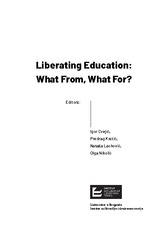An Interpretation of the Educational Process from the Perspective of Kant’s Philosophy of History and Legal-Political Theory
Аутори
Smajević Roljić, MilicaОстала ауторства
Cvejić, Igor
Krstić, Predrag

Lacković, Nataša
Nikolić, Olga

Поглавље у монографији (Објављена верзија)
Метаподаци
Приказ свих података о документуАпстракт
Although he considered education to be one of the greatest challenges facing the individual and the human race in general, Kant (Immanuel Kant) left behind relatively little written testimony on the subject, which is why his works on education are best interpreted if placed in the broader context of his philosophy. Kant's understanding of education is most often interpreted from the perspective of his ethics, where the importance of the moral development and cultivation of each individual is particularly emphasized. The topic of this article, however, will be somewhat different. Instead of the usual analysis of one's duties to oneself and emphasizing the importance of developing one's own talents for the purpose of personal growth and education, attention will be paid to examining the phenomenon of education from the perspective of Kant's philosophy of history and legal-political theory. We will see that this perspective is very important, because it shows us that the goals of educatio...n coincide to a large extent with the goals of the historical-political process. Also, educational and historical-political processes take place in parallel and influence each other. That is why in this paper we will examine their mutual relationship. We will argue that without progress in one field, there is no progress in another: the full development of educational potentials is impossible to achieve in an underdeveloped society.
Кључне речи:
education / historical process / cosmopolitanism / progress / legal freedom / republican system / enlightenmentИзвор:
Liberating Education: What From, What For?, 2021Издавач:
- Beograd : Institut za filozofiju i društvenu teoriju
Финансирање / пројекти:
- Министарство науке, технолошког развоја и иновација Републике Србије, институционално финансирање - 200025 (Универзитет у Београду, Институт за филозофију и друштвену теорију) (RS-MESTD-inst-2020-200025)
Колекције
Институција/група
IFDTTY - CHAP AU - Smajević Roljić, Milica PY - 2021 UR - http://rifdt.instifdt.bg.ac.rs/123456789/2517 AB - Although he considered education to be one of the greatest challenges facing the individual and the human race in general, Kant (Immanuel Kant) left behind relatively little written testimony on the subject, which is why his works on education are best interpreted if placed in the broader context of his philosophy. Kant's understanding of education is most often interpreted from the perspective of his ethics, where the importance of the moral development and cultivation of each individual is particularly emphasized. The topic of this article, however, will be somewhat different. Instead of the usual analysis of one's duties to oneself and emphasizing the importance of developing one's own talents for the purpose of personal growth and education, attention will be paid to examining the phenomenon of education from the perspective of Kant's philosophy of history and legal-political theory. We will see that this perspective is very important, because it shows us that the goals of education coincide to a large extent with the goals of the historical-political process. Also, educational and historical-political processes take place in parallel and influence each other. That is why in this paper we will examine their mutual relationship. We will argue that without progress in one field, there is no progress in another: the full development of educational potentials is impossible to achieve in an underdeveloped society. PB - Beograd : Institut za filozofiju i društvenu teoriju T2 - Liberating Education: What From, What For? T1 - An Interpretation of the Educational Process from the Perspective of Kant’s Philosophy of History and Legal-Political Theory UR - https://hdl.handle.net/21.15107/rcub_rifdt_2517 ER -
@inbook{
author = "Smajević Roljić, Milica",
year = "2021",
abstract = "Although he considered education to be one of the greatest challenges facing the individual and the human race in general, Kant (Immanuel Kant) left behind relatively little written testimony on the subject, which is why his works on education are best interpreted if placed in the broader context of his philosophy. Kant's understanding of education is most often interpreted from the perspective of his ethics, where the importance of the moral development and cultivation of each individual is particularly emphasized. The topic of this article, however, will be somewhat different. Instead of the usual analysis of one's duties to oneself and emphasizing the importance of developing one's own talents for the purpose of personal growth and education, attention will be paid to examining the phenomenon of education from the perspective of Kant's philosophy of history and legal-political theory. We will see that this perspective is very important, because it shows us that the goals of education coincide to a large extent with the goals of the historical-political process. Also, educational and historical-political processes take place in parallel and influence each other. That is why in this paper we will examine their mutual relationship. We will argue that without progress in one field, there is no progress in another: the full development of educational potentials is impossible to achieve in an underdeveloped society.",
publisher = "Beograd : Institut za filozofiju i društvenu teoriju",
journal = "Liberating Education: What From, What For?",
booktitle = "An Interpretation of the Educational Process from the Perspective of Kant’s Philosophy of History and Legal-Political Theory",
url = "https://hdl.handle.net/21.15107/rcub_rifdt_2517"
}
Smajević Roljić, M.. (2021). An Interpretation of the Educational Process from the Perspective of Kant’s Philosophy of History and Legal-Political Theory. in Liberating Education: What From, What For? Beograd : Institut za filozofiju i društvenu teoriju.. https://hdl.handle.net/21.15107/rcub_rifdt_2517
Smajević Roljić M. An Interpretation of the Educational Process from the Perspective of Kant’s Philosophy of History and Legal-Political Theory. in Liberating Education: What From, What For?. 2021;. https://hdl.handle.net/21.15107/rcub_rifdt_2517 .
Smajević Roljić, Milica, "An Interpretation of the Educational Process from the Perspective of Kant’s Philosophy of History and Legal-Political Theory" in Liberating Education: What From, What For? (2021), https://hdl.handle.net/21.15107/rcub_rifdt_2517 .


